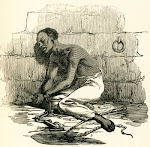 Newt Gingrich see an evolving role for the Tea Party, as the " militant wing" of the Republican Party.
Newt Gingrich see an evolving role for the Tea Party, as the " militant wing" of the Republican Party.He makes that observation with a certitude befitting the groups recent activities.
The dominance of the two party system almost certainly puts the Tea Party in the Republican camp, given their conservative bent, and their obvious distaste for everything Obama.
A recent poll confirms Newt's prescience regarding the group:
"The 18 percent of Americans who identify themselves as Tea Party supporters tend to be Republican, white, male, married and older than 45."
Also, according to the same poll, these white males aren't hayseeds, poverty-stricken, or likely to be, and neither are they grade-school dropouts.
"Tea Party supporters are wealthier and more well-educated than the general public, and are no more or less afraid of falling into a lower socioeconomic class...."
Assuming the accuracy of the poll, these aren't the typical malcontents, the usual suspects we might find protesting the size of government, or its overreaching ambitions to usurp state powers.
These aren't your "bitter" white men clinging to their "guns or religion." Obama captures this group with deft words, but is later skewered for it:
"You go into these small towns in Pennsylvania and, like a lot of small towns in the Midwest, the jobs have been gone now for 25 years and nothing’s replaced them…And they fell through the Clinton Administration, and the Bush Administration, and each successive administration has said that somehow these communities are gonna regenerate and they have not.
"And it’s not surprising then they get bitter, they cling to guns or religion or antipathy to people who aren’t like them or anti-immigrant sentiment or anti-trade sentiment as a way to explain their frustrations."
We have a new breed: These are "bigoted" white men, clinging to their 401(K)'s and the religion of non-governmental interference in free-market activities.
It doesn't matter that this selfsame market and its unscrupulous adherents nearly brought our economy to near collapse. What's important is that it remains "free".
And this is the mantra that emanates from this movement.
Liberals, with their misguided efforts to address society's deficiencies, and ills, are perpetrating the greatest crime, the unforgivable offense: They're depriving Americans of their constitutionally protected freedom.
The freedom to participate, or not to participate.
It doesn't matter that that freedom was a myth, almost from the inception of this Republic, Tea Partiers are intent on resurrecting that myth, and expanding the mythology.
They distance themselves from regular, run-of-the-mill Republicans by holding "more conservative views on a range of issues than Republicans generally. They are also more likely to describe themselves as 'very conservative' and President Obama as 'very liberal.'"
And Tea Partiers are "angry," more angry than their fellow conservatives:
"And while most Republicans say they are “dissatisfied” with Washington, Tea Party supporters are more likely to classify themselves as 'angry.'"
Given the movement's emphasis on a "smaller government," you wouldn't expect it to give thumbs up to Social Security and Medicare. Yet, it does.
Even more telling is the group seeming antipathy for the poor:
"Tea Party supporters’ fierce animosity toward Washington, and the president in particular, is rooted in deep pessimism about the direction of the country and the conviction that the policies of the Obama administration are disproportionately directed at helping the poor rather than the middle class or the rich."
I suppose Tea Partiers see Obama as some modern-day Robin Hood, who takes from the rich and gives to the poor.
Were that the case! For decades we've seen just the opposite: The rich get richer, and the poor, poorer.
Take a look at what has happened to our automotive industry, and the once proud City of Detroit, and why a bailout of General Motors (condemned by Tea Partiers) may have kept the city from becoming as bankrupt as the car manufacturer itself.
Investment bankers have rigged the game to favor themselves, even if it means the collapse of our economy in their pursuit of more and more wealth, and the means of maintaining that wealth, using "too big to fail" as their edge in the game, all but insuring their survival while their less-powerful competition falls by the wayside.
And the most telling aspect of the poll is this revelation:
"They are more likely than the general public, and Republicans, to say that too much has been made of the problems facing black people."
At the risk of painting this group with a broad brush, they have shown themselves to be ultra-conservative to the point of dismissing the poor, and the concerns of blacks, regardless of their merit.
The Tea Party folks are showing what may be the true face of America, a face that I'm all too familiar with.
How do we measure our greatness as a nation? Do we measure it by how many of our people have health care, or by the exceptional quality of our health care system; by the quality education extended to all, or by the state of our educational system for those who can afford it; by the number of people on welfare, or the number who don't require it at all; by the opportunities afforded to all regardless of social status, or race, or the number who are privileged with it from birth by virtue of color?
We're only as great as the number of us who have access to that greatness, the number of us who can rise as high as our talent, skills, and intellect will carry us, without, first, having to throw off the weight of social stigma, and racial inequalities.








